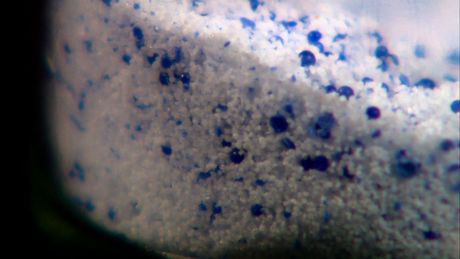Microbeads and the need for a national ban

Plastic, in all its forms, can be a pain in the neck for waste managers. It is light, voluminous and not worth very much.
But small bits of plastic like microbeads, found in common cosmetics such as face washes, exfoliants and toothpastes, have been wreaking havoc on waterways and soil systems across the world.
Microbeads are small enough to be mistaken for food by many marine organisms. Once ingested, these microbeads can release chemicals such as polychlorinated biphenyls, polycyclic aromatic hydrocarbons and triclosan — known endocrine disruptors and carcinogens, which can then become part of the food chain.
California has already passed a ban on microbeads to take effect on 1 January 2020. Canada is considering a ban — so what is Australia doing?
Banning the microbead in Australia
Data on microbead tonnages is hard to come by, so let’s do a quick back-of-the-envelope calculation. Australia has a population of 23 million. Let’s assume one-third buy face wash containing microbeads. Say a bottle of face wash is 200 g. On average, about 10% are microbeads. Say a person uses four bottles per year.
So if 7 million Australians buy and use four bottles of face wash a year, we would be generating, and polluting into the environment, 560 tonnes of microbeads per year. And this is just face wash. Add on toothpastes and exfoliants.
A University of New South Wales study analysed sediment samples from 27 different sites around Sydney Harbour. It found high levels of microbeads in the sediment — enough to disrupt ecological processes.
What are the alternatives?
On the positive side, some big-name companies are voluntarily phasing out use of microplastics in Australia. Unilever, L’Oreal, The Body Shop, Clearasil, Clarins and Ella Bache have all committed to phasing out use in cosmetics by 2016.
Fruit pits, oatmeal and sea salt are already being considered by these companies as alternatives. There are opportunities for local companies such as Ella Bache to work with food manufacturers to utilise the by-products of food manufacturing such as fruit skins, seeds and shells as alternatives to microbeads. Perhaps this is also an opportunity to further industrial ecology in Australia.
The steps forward
Microbeads are clearly pernicious. While I fully support the actions of the companies mentioned above, what is to stop freeloaders? Banning the use of these plastics at a federal level is the most cost-effective option to prevent importers and freeloaders while protecting the environment.
F-Gas Regulation: Turning necessity into opportunity
technotrans demonstrates how businesses can successfully manage this transition and turn...
Sustainability in 2026: what's next for Australian businesses?
No longer is it just about reporting; it's about using these frameworks to drive meaningful...
Net zero or 1.2 million homes: trade-off or win-win?
The housing accord's ambitious goal of building 1.2 million homes by June 2029 could impact...







